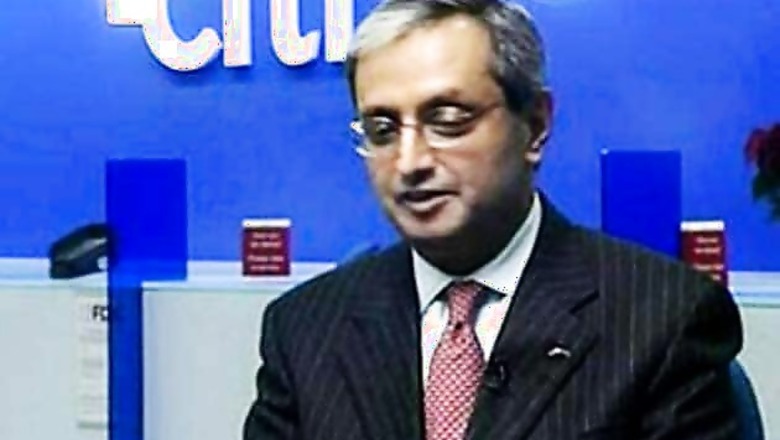
views
New York: Citigroup Inc Chief Executive Vikram Pandit resigned abruptly on Tuesday, effective immediately, a shock change at the top of the No 3 US bank just one day after a surprisingly strong quarterly earnings report.
Analysts and investors quickly raised red flags about the timing, saying it did not appear to be a natural transition and rather suggested some sort of dispute at the bank.
But Citigroup shares rose 1.5 percent in morning trading as some investors said they were not sorry to see the one-time hedge fund executive leave.
A statement from Chairman Michael O'Neill said Michael Corbat, previously chief executive for Europe, Middle East and Africa, would succeed Pandit as CEO and as a board member.
Within minutes of the bank's announcement, Pandit's name was gone from Citigroup's website.
Chief Operating Officer John Havens, a long-time associate of Pandit, also resigned. The fact that both Pandit and Havens left was another red flag that observers suggested pointed to some sort of difference of opinion with the Citigroup board.
The board's relationship with Pandit was already under pressure after shareholders rejected the CEO's pay package in an advisory vote. He was awarded more than $15 million in 2011 compensation, but 55 percent of shareholders voted against it at an April meeting.
"It's not a shock that (Pandit) is no longer there, but the surprise is this is all happening very quickly. Why is he leaving immediately?" said Mike Holland, chairman of New York-based Holland & Co, which oversees more than $4 billion of assets.
"I'm not a Citi shareholder, but if I were, I'd be disappointed that Havens is gone, in some ways more than Pandit," Holland added.
Pandit's resignation comes after a series of high-profile defeats this year. In March the Federal Reserve rejected the bank's capital plans after a stress test; Pandit had led analysts and investors to believe the dividend-raising plans would be approved.
Last month, Pandit agreed to a low sale price for his bank's stake in the brokerage operated by Morgan Stanley. Citigroup had to take a $4.7 billion charge in the third quarter to write down the value of that stake.
Yet the bank's stock rose sharply on Monday after Citigroup reported third-quarter results, even with the write-down, that were much better than analysts expected. The stock gained another 45 cents to $37.11 in morning trading.
The one-two punch of the results and Pandit's exit point to what analysts say has been a years-long unsettled atmosphere around the bank.
"What Pandit and Havens did was increase the uncertainty around Citi," said Matt McCormick, banking analyst and portfolio manager at Bahl & Gaynor in Cincinnati, Ohio. "There's a perpetual cloud of uncertainty surrounding Citigroup. There's always turmoil ... that's had to affect the stock price."
Pandit's resignation revived questions that were asked from the day he took the job: whether he had the right experience to lead Citigroup in the first place.
Born in Nagpur, India, the 55-year-old Pandit obtained two electrical engineering degrees and a doctorate in finance from Columbia University. He joined Citigroup in July 2007 when the bank acquired his hedge fund and private equity firm, Old Lane Partners LP, for $800 million. Citigroup had to shut down Old Lane the next summer, an early black mark for the executive.
Critics later charged that Pandit was too timid, perhaps even too academic, to run a big consumer bank.
"He was not beloved by Wall Street. He was thrust into that position - he's a hedge fund guy," McCormick said.
Pandit and Havens long have been linked together in their careers, which dampened the surprise around Havens' exit to some degree. The two worked at Morgan Stanley in the 1980s and 1990s before forming Old Lane.
Pandit's successor, Corbat, has held a number of senior roles at Citigroup, including running Citi Holdings, the unit established to house businesses and assets the company wants to shed.
A fixed income salesman by training, Corbat started out at Salomon Brothers in 1983. More recently, he has been credited with successfully restructuring some of Citigroup's consumer and credit card units.
In a letter to Citigroup staff after his elevation, Corbat said he expected to make some organizational changes after a review but that he was generally pleased with the company's direction.
"I believe the fundamentals we have in place today are strong and that we are on the right path," he said in the letter, a copy of which was obtained by Reuters.
Corbat was a standout football player at Harvard and once had aspirations to play professionally. But as he noted in a 1982 profile in the Harvard Crimson, he was perhaps too skinny to make it in the National Football League.


















Comments
0 comment